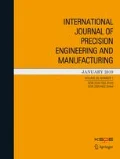Abstract
An analysis on the sustainability of micro-EDM drilling is presented. A process sustainability index was calculated taking into account energy consumption and tool wear during the drilling process. The machining accuracy was also taken into account to calculate the overall sustainability index. The index was validated considering the drilling of three different workpiece materials (stainless steel, tungsten carbide and aluminium) with two electrode materials (brass and tungsten carbide) and different process parameters. An analysis about the influence of workpiece and electrode materials on the sustainability index was carried out. In general, the tool wear has the highest impact on the process sustainability. Considering only the wear and the energy consumption, brass electrode is much more sustainable than the tungsten carbide one for all the tested conditions. This gap is less remarkable if the respect of dimensional tolerances and the consequent percentage of non-conformity is taken into account. From the point of view of the workpiece material, aluminium minimizes the process environmental impact. Finally, the effects on the index of the process parameters, the thermal and electrical characteristics of the electrode and the workpiece materials were evaluated. These results can be useful for approaching a more environmental-oriented strategy in manufacturing.
Similar content being viewed by others
References
Sarkar, A. N., “Promoting Eco-Innovations to Leverage Sustainable Development of Eco-Industry and Green Growth,” European Journal of Sustainable Development, Vol. 2, No. 1, pp. 171–224, 2013.
Jayal, A. D., Badurdeen, F., Dillon Jr, O. W., and Jawahir, I. S., “Sustainable Manufacturing: Modeling and Optimization Challenges at the Product, Process and System Levels,” CIRP Journal of Manufacturing Science and Technology, Vol. 2, No. 3, pp. 144–152, 2010.
Valaki, J. B. and Rathod, P. P., “Assessment of Operational Feasibility of Waste Vegetable Oil Based Bio-Dielectric Fluid for Sustainable Electric Discharge Machining (EDM),” The International Journal of Advanced Manufacturing Technology, Vol. 87, Nos. 5–8, pp. 1509–1518, 2016.
El-Hofy, H. and Youssef, H., “Environmental Hazards of Nontraditional Machining,” Proc. of the 4th IASME/WSEAS International Conference on Energy & Environment, pp. 140–145, 2009.
Leão, F. N. and Pashby, I. R., “A Review on the Use of Environmentally-Friendly Dielectric Fluids in Electrical Discharge Machining,” Journal of Materials Processing Technology, Vol. 149, Nos. 1–3, pp. 341–346, 2004.
Zeng, Z., Wang, Y., Wang, Z., and Shan, D.-B., “Effect of Dielectric Medium on Electrode Wear in Micro-Electrical Discharge Milling,” Nanotechnology and Precision Engineering, Vol. 22, No. 1, pp. 27–35, 2012.
Khatri, B. C. and Rathod, P. P., “Investigations on the Performance of Concentric Flow Dry Wire Electric Discharge Machining (WEDM) for Thin Sheets of Titanium Alloy,” The International Journal of Advanced Manufacturing Technology, Vol. 92, Nos. 5–8, pp. 1945–1954, 2017.
Lin, Y.-C., Hung, J.-C., Lee, H.-M., Wang, A.-C., and Chen, J.-T., “Machining Characteristics of a Hybrid Process of EDM in Gas Combined with Ultrasonic Vibration,” The International Journal of Advanced Manufacturing Technology, Vol. 92, Nos. 5–8, pp. 2801–2808, 2017.
Shabgard, M. R., Gholipoor, A., and Baseri, H., “A Review on Recent Developments in Machining Methods Based on Electrical Discharge Phenomena,” The International Journal of Advanced Manufacturing Technology, Vol. 87, Nos. 5–8, pp. 2081–2097, 2016.
Sadagopan, P. and Mouliprasanth, B., “Investigation on the Influence of Different Types of Dielectrics in Electrical Discharge Machining,” The International Journal of Advanced Manufacturing Technology, Vol. 92, Nos. 1–4, pp. 277–291, 2017.
Ray, A., “Optimization of Process Parameters of Green Electrical Discharge Machining Using Principal Component Analysis (PCA),” The International Journal of Advanced Manufacturing Technology, Vol. 87, Nos. 5–8, pp. 1299–1311, 2016.
Singh, R. K., Murty, H. R., Gupta, S. K., and Dikshit, A. K., “An Overview of Sustainability Assessment Methodologies,” Ecological Indicators, Vol. 9, No. 2, pp. 189–212, 2009.
Fiksel, J., McDaniel, J., and Spitzley, D., “Measuring Product Sustainability,” Journal of Sustainable Product Design, Vol. 6, No. 7, pp. 7–18, 1998.
De Silva, N., Jawahir, I., Dillon Jr, O., and Russell, M., “A New Comprehensive Methodology for the Evaluation of Product Sustainability at the Design and Development Stage of Consumer Electronic Products,” International Journal of Sustainable Manufacturing, Vol. 1, No. 3, pp. 251–264, 2009.
Bork, C. A. S., de Souza, J. F., de Oliveira Gomes, J., Canhete, V. V. P., and De Barba, D. J., “Methodological Tools for Assessing the Sustainability Index (SI) of Industrial Production Processes,” The International Journal of Advanced Manufacturing Technology, Vol. 87, Nos. 5–8, pp. 1313–1325, 2016.
Liu, K., Lauwers, B., and Reynaerts, D., “Process Capabilities of Micro-EDM and Its Applications,” The International Journal of Advanced Manufacturing Technology, Vol. 47, Nos. 1–4, pp. 11–19, 2010.
D’Urso, G., Maccarini, G., and Ravasio, C., “Process Performance of Micro-EDM Drilling of Stainless Steel,” The International Journal of Advanced Manufacturing Technology, Vol. 72, Nos. 9–12, pp. 1287–1298, 2014.
D’Urso, G., Maccarini, G., and Ravasio, C., “Influence of Electrode Material in Micro-EDM Drilling of Stainless Steel and Tungsten Carbide,” The International Journal of Advanced Manufacturing Technology, Vol. 85, Nos. 9–12, pp. 2013–2025, 2016.
D’Urso, G., Maccarini, G., Quarto, M., and Ravasio, C., “Investigation on Power Discharge in Micro-EDM Stainless Steel Drilling Using Different Electrodes,” Journal of Mechanical Science and Technology, Vol. 29, No. 10, pp. 4341–4349, 2015.
D’Urso, G. and Ravasio, C., “Material-Technology Index to Evaluate Micro-EDM Drilling Process,” Journal of Manufacturing Processes, Vol. 26, pp. 13–21, 2017.
Author information
Authors and Affiliations
Corresponding author
Additional information
Gianluca D’Urso Associate Professor in University of Bergamo, Italy. His research interests are technologies and manufacturing systems.
Claudio Giardini Full Professor in University of Bergamo, Italy. His research interests are technologies and manufacturing systems.
Chiara Ravasio Assistant Professor in University of Bergamo, Italy. Her research interests are micromachining and unconventional technologies.
Rights and permissions
About this article
Cite this article
D’Urso, G., Giardini, C. & Ravasio, C. Effects of Electrode and Workpiece Materials on the Sustainability of Micro-EDM Drilling Process. Int. J. Precis. Eng. Manuf. 19, 1727–1734 (2018). https://doi.org/10.1007/s12541-018-0200-2
Received:
Revised:
Accepted:
Published:
Issue Date:
DOI: https://doi.org/10.1007/s12541-018-0200-2




